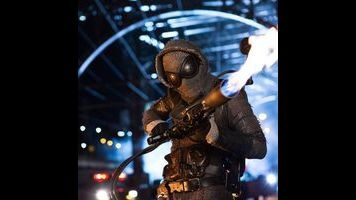The biggest problem plaguing “By Fire,” and really Gotham as a whole, is that it wants to explore the story of Gordon’s potentially compromised morality with as much gravitas as possible while also insisting that the more comic and cartoonish tendencies are fine because hey, this is just a comic book show, right? It’s a flippancy that’s insulting to anyone who watches the show and tries to invest in these characters, and it’s a general lack of attention paid to storytelling that results in frustrating swings in tone. “By Fire” largely focuses on how, after the killing of a young cop last week, Gordon is feeling guilty about bringing his Strike Force into the field and risking their lives with little real-world training behind them. He’s at his wit’s end and is ready to do anything to catch the culprit, even if that means beating up suspects in front of his new recruits. It’s the skeleton outline of the typical “good cop does shady things” storyline, but “By Fire” never really goes far enough to make it interesting, to tell us anything about Gordon.
In fact, the majority of the plotline is overwritten, cliché dialogue and violent swings in character insight. When Captain Barnes reprimands Gordon for physically assaulting a suspect, Gordon replies by spouting rhetoric about how “war” makes every action okay, and how there’s no sense of honor or duty because “this is Gotham.” It’s rhetoric that the show pulls out often when it wants to put its gritty drama mask on and play pretend prestige, but it’s so self-serious that it’s laughable. Things only get worse when, just a few scenes later, Barnes does a complete 180 and tells Gordon to bring in Firefly by “any means necessary.” Having a character question and ultimately change their perspective on something is fine, but is it too much to ask the Gotham writers to put a little thought and care into the process? “By Fire” suggests that yes, that is too much to ask.
I mentioned in last week’s review that Gotham wanted to have its cake and eat it too in relation to origin stories, but that kind of troubling attitude towards storytelling is even more evident this week. “By Fire” wants to pack an emotional punch. The whole story of Firefly is meant to deepen our understanding of Selina Kyle while also implicating Gordon in the violence happening throughout Gotham. Bridgit was abused and manipulated into become Firefly, and Selina wants Gordon to protect her because of it. Jim agrees, but she dies anyways after a confrontation with the police leads to her setting herself on fire. Gotham presents this two-episode arc as emotionally devastating for Gordon and Selina, but those beats never feel consequential because of how little time the show spends digging into the psyche of its characters, and because so much of “By Fire” tries to be funny. It’s a move that runs contrary to everything the Firefly arc is trying to achieve in terms of drama, and the balance, as usual, is never found.
Now, to be fair, a lot of the comedy stuff in “By Fire” works. In particular, the story of Butch as Penguin’s reluctant, brainwashed servant grows more surreal and entertaining each and every week. Here he briefly infiltrates the Galavan family, only to have Barbara and Tabitha joke about how they should put cool things on his stump to make him more villainous. The cut to the next scene, which sees Butch report back to Penguin with a huge mallet now attached to his stump, is genuinely funny. It’s an absurd, hilarious sight gag made all the more funny when Penguin struggles to comment on Butch’s bad luck, only condescendingly suggesting how the mallet is practical and useful. The trouble is that these comedy bits never really find a footing in the larger narrative, never really contribute to a consistent tone and aesthetic from one episode to the next.
On the plus side, the episode ends with a burnt Firefly being ushered into Indian Hill, a strange underground facility where, as a nice little bit of exposition informs us, there are “tests” done on “monsters.” I know better than to get my hopes up when it comes to Gotham, but it’s time for the show to shake up the status quo, and perhaps the reveal of Indian Hill can do just that.
Stray observations
- Never Mind The Bullocks: It’s a tie between Bullock talking to Ivy “Ginger to Ginger,” or him calling Gordon’s Strike Force “The Fascist Youth.”
- So, we’re basically right back where we started with Nygma, except Kringle now knows how demented he is. What a useless character/arc.
- So, Kringle and Thompkins are apparently best buds who talk romance and sex at work? Who knew!?!?
- I’m really stoked that the Pike Brothers are dead because they were the worst, most generic villains.
- Galavan’s response to Butch wanting to work for him: “I already have several capable, two-handed thugs.”
- I love how Michael Chiklis’ guest spot gets so heavily advertised, and then Gotham sticks him behind a desk.
- As always, the Bruce/Alfred stuff is reliably charming, but something tells me that centuries-old blood feud with the Galavan family is going to be relevant sometime soon.









































